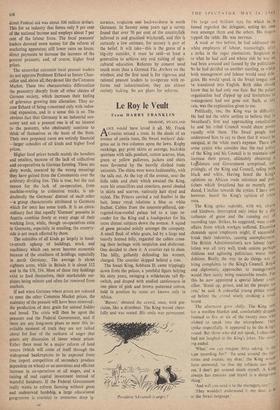Le Roy le Veult
From HARRY FRANKLIN
MBABANE, SWAZILAND LICE would have loved it all. Mr. Frank ACousins missed a treat. In the shade of an avenue of cassia trees, the Swazi workers' dele- gates sat in two columns upon the lawn. Rugby stockings, gay print skirts or sarongs, buckskin sporrans with tails pendant, cotton scarves, blue, green or yellow pullovers, jackets and shirts were favoured by the heavily clothed trade unionists. The shirts were worn fashionably, with the tails out. At the top of the avenue, near the little table and chair which awaited the King, were his councillors and courtiers, pastel shaded in skirts and scarves, variously hair dyed and styled. The Princes carried a red feather in the hair, lesser royal relations a blue or white feather. Cables from the concrete-pillared, cor- rugated-iron-roofed palace led to a tape re- corder for the King and a loudspeaker for his more distant subjects down the avenue. A squad of geese paraded noisily amongst the company. A small flock of white goats, led by a large and heavily horned billy, regarded the cables cross- ing their herbage with suspicion and disfavour. One decided to chew it. A courtier ran to shoo. The billy, gallantly defending his women, charged. The courtier skipped behind a tree. The Swazi King, Sobhuza II, came trippingly down from the palace, a youthful figure belying his sixty years, swinging a wildebeeste tail fly- switch, and draped with studied carelessness in one piece of pink and brown patterned cotton, held in position by some art known only in Africa.
'Bayete,' shouted the crowd, once, with pre- cision, like a drumbeat. The King waved cheer- fully and was seated. His smile was permanent.
'President Nkrumah is angry !'
THE SPECTATOR MAY 24. 1963 he large and brilliant eyes for which he is famed regarded the delegates, noting his own men amongst them and the others. His fingers tapped the table. He was nervous.
A week or two before, he had addressed the white employers of labour, reassuringly, after a strike in the sugar plantations. Suspicion as to what he had said and whose side he was on had been aroused and fanned by the politicians- So he had decided on another meeting, to which both management and labour would send dela- gaes. He would speak in the Swazi tongue and he translated into English. Both sides should know that he had only one face. But the palace organisation had slipped up and invitations to management had not gone out. Such, at any rate, was the explanation given to me.
Politically, too, the King was in difficulty. He had led the white settlers to believe that in Swaziland's first and approaching constitution he and his tribal Council would share power equally with them. The Swazi people had understood him to say to them that it would be unequal, at the white men's expense. There are some cynics who consider that the real policY of the King and his Council is to maintain and increase their. power, ultimately obtaining a Leslature and Government comprised, sur- prisingly, of the King and Council, ruling both black and white. Having heard the Kings opinions on African trade unionists and poli- ticians which Swaziland has so recently pro- duced, I incline towards the cynics. I have not, however, heard the King's opinion of wliitc men.
The King spoke superbly, with wit, charm and kindness, interrupted only twice by a dis- turbance of geese and the running out of recording tape. Strikes, he suggested, were crude affairs from which workers suffered. Excessive demands upon employers might, if successful, break their industries, causing unemployment. The British Administration's new labour legis- lation was all very well, trade unions perhaps than dubious and agitating politicians worse dubious. Really the way to do things was to bring complaints to the King's Council. Royal and diplomatic approaches to managements would then surely bring reasonable results. For this he now appointed a special labour coun- cillor. 'Stand up, prince, and let the people see you,' he said. A colourful young prince stood up before the crowd wisely stroking a small beard.
The afternoon grew chilly. The King sent for a woollen blanket and, comfortably draped,. listened to five or six of the twenty men wh°'. wished to speak into the microphone. The)/ spoke respectfully. It appeared to be the Kings round. But those who did not speak, I obse:- had not laughed at the Kings jokes. The meet-.1 i ng ended.
'What,' one can imagine Alice asking. •k the . tope recording for?' To send- around the Jac" tories and estates, my dear,' the King would have ansvi cited, 'so that my subjects can he3r. me. 1 don't get around much myself. A King always has enemies and travel is a dangeroos thing.'
`And will you send it to the managers, too? 'They wouldn't understand it, my dear: ii ts in the Swazi language.'






































 Previous page
Previous page